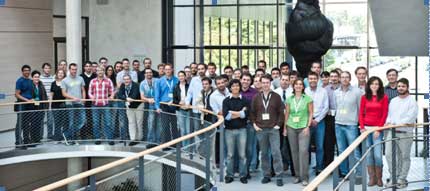
Karlsruhe Institute of Technology puts learning spotlight on fusion.
In September 2011, the 5th International Course on Fusion Technologies took place at the Karlsruhe Institute of Technology (KIT), Germany. A total of 49 participants from 10 countries took advantage of the opportunity to expand their knowledge about fusion technology. Here are the impressions given by a participant in this year’s event:

Impressions of a participant
“I have been working for almost two years in the field of fusion. At the Summer School I expected to get a good overview of all related fusion fields. As an engineer I am particularly interested in the design of fusion components and the problems which have to be overcome in implementation of this innovative technology.
In a fact, the Summer School has met my expectations. The variety of lectures, given by international experts from CCFE, CEA, ENEA, KIT and industry, allowed me to better understand the complexity of a fusion power plant.
All relevant components for the fusion power plant operation were presented after an introduction to the fundamentals of plasma physics. A particular emphasis was given to the material behaviour of shielded and plasma facing components. The long term behaviour of materials under reactor conditions is a very important criterion for the component design.
The various test facilities that we visited illustrated many complex requirements which must be met in order to obtain meaningful and scalable results. For example, in some studies a standard material sample, ~5 cm big, is charged under cryogenic conditions, and in other tests a hall has to be built to test a prototype like the TF coil for ITER.
Detailed presentations on the status of JET, Wendelstein-7X, JT-60SA, ITER and DEMO demonstrated the progress which has taken place in the last decades. Despite the immense progress already achieved, the fusion power plant as a standard reactor for the 21st century remains a challenge.”
|

